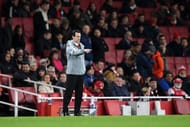On the 7th of October, 2019, Arsenal travelled a few miles west of the Emirates to immerse themselves in a London derby with Fulham. At Craven Cottage, the Gunners blitzed past the hosts, meaning that they rippled the net five times, which included a sumptuous team goal finished off by Aaron Ramsey. Consequently, those that had made a trip burst out into a choreographed symphony to the tunes of ‘We’ve got our Arsenal back’.
A couple of months later, that chorus grew louder when the Gunners produced a stirring comeback to shatter Tottenham Hotspur's dreams in a compelling North London Derby. Thus, at that juncture, the Unai Emery era had reached a crescendo, with many even dizzy at the prospect of what the Spaniard might achieve in the upcoming months.
Yet, a year on from that miraculous performance, cacophony of boos emanate regularly at the Emirates. The encounter against Southampton left the fans fuming and the chagrin became more prevalent after the defeat to Eintracht Frankfurt in the Europa League, where a sparsely populated arena had generated as much noise as the jam-packed stadium against Tottenham, twelve months prior.
Inevitably, the writing seemed to be on the wall for Emery, especially considering there had been a loss of trust among all the stakeholders. The fans had gotten on his back, the board seemed unsure of where the team was heading while the players looked as confused as ever under his tenure.
And, on the 29th of November, Arsenal finally pulled the trigger, thereby sacking the Spaniard after a year and a half at the helm. When the dust settles on the former Sevilla boss’ sacking though, one would probably be better served analysing what exactly went pear-shaped in a reign that started so promisingly for the Gunners. After all, the last thing they would want is their own rendition of the problems engulfing another traditional footballing superpower in Manchester United.
When Emery was handed the reins, he preached a brand of football that would see the North Londoners press incessantly and act as ‘protagonists’ while trying to outwit their opponents. Initially, those aspects came to the fore with the Gunners brave enough to press Manchester City in their first fixture of the 2018-19 Premier League season.
However, in light of the players he had at his disposal, that promise started slipping into oblivion, especially as the term entered its home stretch. Subsequently, Arsenal began retreating into their shell quite a bit, meaning that they allowed their opponents an enormous amount of room in midfield. The above eventually led to their rivals enjoying plenty of shots at goal, something which has only escalated in 2019-20.
Secondly, the effervescent style of football that led many Gooners to waltz into nostalgia and dream of a bright future, dried up after the turn of the year. More worryingly though, that approach was abandoned rather instantly and perhaps even inexplicably.
The alarming trend continued through the final quarter of the previous campaign and was laid bare for everyone to witness at the start of the current term, with the Gunners, somewhat surprisingly, even seeming afraid of imposing themselves on a game.

More importantly though, the post-Arsene Wenger transition under Emery had cast Arsenal as a reactive team, rather than a proactive one, meaning that the Emirates faithful were suddenly treated to something entirely different to what they’d been experiencing, over the years.
And, ironically, while that particular trait was something they’d longed for in the twilight of the Frenchman’s spell, it arguably became the decisive tilting scale for the support (or lack thereof) his successor enjoyed.
Consequently, the atmosphere at the club grew toxic. Fans began boycotting games, the much-maligned Arsenal Fan TV (AFTV) found its voice and the side started getting booed on a consistent basis at home matches. And, that probably ensured that Emery felt both edges of a sword that showers equal amounts of adulation and criticism on professional footballing entities.
Pursuant to the above, each mistake the Spaniard committed was magnified as the fan base was at times, even guilty of fervently searching for a reason to get Emery the boot. To put things into perspective, some were even willing to forego the love they had for the club, hoping for negative results that would ultimately force the board to take swift action.
The environment the fans had contrived to create also started rubbing off on the players, with several questioning if the former PSG manager was indeed suitable for the job.
Moreover, the board also started believing that the Spaniard was losing his grip on the squad, meaning that there were a few questionable decisions behind the scenes, injunctions that also undermined Emery’s authority.

A perfect example of the above was the acquisition of David Luiz, who, despite all his credentials, was just not cut out of the cloth Emery demanded. To drive the point home, it wasn’t long ago that the Brazilian departed for Chelsea when the Spaniard oversaw affairs at PSG.
Thus, through the course of a rather troubled stay in North London, everything that could go wrong for Emery eventually did. While he began on a positive note and threw a blanket of genuine sanguineness around the Emirates initially, he quickly started being portrayed as the pantomime villain, although he wasn’t entirely at fault.
Subsequently, it is important for one to understand that while the Spaniard's handling of personalities (read Granit Xhaka and Mesut Ozil) and tactics left a lot to be desired, the board, the fans and the players certainly didn’t wrap themselves in any sort of glory whatsoever.
At a time when a beleaguered manager might’ve needed a shoulder to lean on, each of the above sold him down the river, meaning that he was left waging a lone and rather unenviable battle.
Funnily though, Emery, who was once hailed as the tactical cure to Arsenal’s ailments, would now be remembered as the malaise that spiralled an already stagnating club downwards.
And, as for his wish of being the ‘protagonist’, it’s fair to say that his journey to becoming the ultimate antagonist came to fruition rather early.
